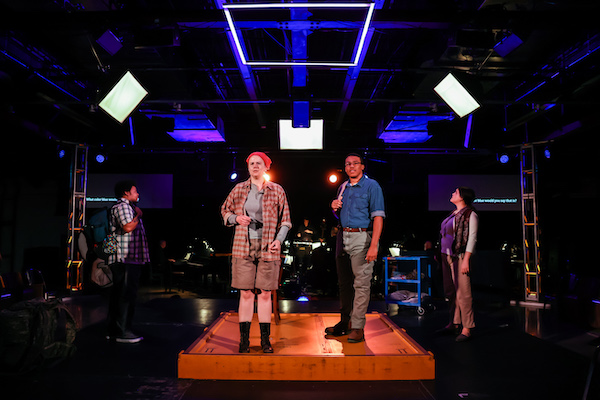HGO’s “Another City” premiere sensitively explores the plight of the homeless

Decades of commissioning and premiering works by composers such as John Adams, Philip Glass and other big names may have brought Houston Grand Opera prestige. But the company has also midwifed a series of less-ballyhooed works: chamber operas that describe life in HGO’s hometown, from its ethnic communities to hurricanes and NASA.
The latest, premiered Thursday, turns to a topic that’s familiar in all big cities: homelessness.
Another City depicts people who, much like the rest of us, are simply getting on with their lives—even if their circumstances are much more harsh. Composer Jeremy Howard Beck and librettist Stephanie Fleischmann do not shy away from the hardships of life on the streets. The 75-minute drama instead puts them in the context of a day in the life of the homeless.
The many characters include not only the homeless but people who come into contact with them. Among the former are Langston Rodriguez, a young man new to homelessness, who takes refuge in library books, and Cassandra Smith, a military veteran who is slated to move into an apartment provided by a group that aids the homeless, but still feels the pull of the freedom she finds in the outdoors.
There is also the Navigator, a social worker trying to pave Cassandra’s way to her apartment and Miss Violet, a retiree, who runs the laundry service at a homeless center.
Another City plays down typical operatic trappings. HGO is staging it at Ecclesia, a Houston church housed in a one-story, nearly windowless building that could just as well contain a machine shop or auto-parts warehouse.
The opera itself takes the same tack. Fleischmann’s libretto sidesteps traditional operatic poesy, instead letting the characters interact and tell their stories in natural, conversational terms. Beck, a young composer who studied with John Corigliano, Christopher Rouse and others, has a knack for crafting vocal lines that amplify the text’s conversational clarity and flow.
The scenes spotlighting Manoj Mukherjee, a homeless man with a spiritual bent, unfold in ethereal phrases that befit his otherworldly calm. But Langston’s story of a night in the outdoors—the opera’s most powerful episode—rises from a peaceful opening to a fever pitch of anguish.
To put across the agitation of the woman who may be mentally ill—clinging to an outlandish tale that her uncle received millions of dollars from Maria Callas—Beck thrusts her voice aloft again and again. Cassandra’s part unfolds in matter-of-fact phrases that befit her lack of fear about potentially staying on the street rather than going into an apartment.
Beck marshals his eight-player instrumental ensemble—dominated by keyboards, saxophones and percussion—mainly to generate evocative sonorities. While the delicate sounds, including gently chiming percussion, set the tone for Manoj, the ensemble—conducted by Alex Amsel—turns to deep, glowering sonorities and punching accents to drive home moments of tension. When Hank Edwards, a drifter with a cowboyish air, introduces himself, guitar and drum set give the music a country-western tinge.
Saxophones lend a seductive slinkiness to the Callas woman’s tale about her uncle and the diva. As the opera approaches its close, the ensemble’s quieter tones take over, and several of the characters take comfort in reaching the end of another day: “I’m good,” they declare.
Beck’s scoring sometimes leans heavily on the keyboard and percussion, stirring up so hefty a sound that it booms inside Ecclesia’s meeting room, which is spacious but low-ceilinged. Microphones next to the singers’ cheeks help the voices cut through, but whenever two or three overlap, they’re prone to block each other out.
With so much of the focus on the characters and the little soliloquies through which they reveal themselves, Another City is short on narrative momentum. But the cast by and large embodies the characters so potently that it keeps the story alive.
On Thursday, tenor Joshua Blue portrayed Langston in fresh, youthful tones that first made him a sympathetic figure, then made it all the more arresting when he suddenly opened up with visceral, ringing outbursts to climax his story of the stress of a night on the street.
Soprano Renée Richardson sang just as fearlessly as the woman with the Callas tale: Her voice sailed aloft freely and vibrantly to put over the intensity of someone whose grasp of reality may be slipping away.
At the other extreme, tenor Rohan Ramanan offered a lightness and sweetness that suited Manoj’s meditative aura.
Baritone Aaron Jacob Kenney not only exuded Hank’s bravado through his resonance and vocal swagger, but he offered an object lesson in how singing can be as clear and lively as speaking.
Mezzo-soprano Sarah Larsen projected Cassandra’s strength through her rich, sturdy tones and resolute demeanor. Tenor Travon Walker sang with a brightness and energy that left no doubt that Cassandra’s Navigator was devoted to his mission of getting her into her apartment.
Mezzo-soprano Emily Treigle’s warm voice and ready smile radiated Miss Violet’s kindness. Soprano Sarah Larsen made the volunteer girl who works alongside Miss Violet an unexpectedly compelling figure—at first jittery and hesitant, but ultimately singing with a glow that revealed that the day’s experiences had moved her.
Sopranos Meryl Dominguez and Aarianna Longino, tenor Norman Matthews and bass-baritone Nicholas Davis sketched in vivid supporting characters.
Director Emily N. Wells’ staging unfolded on a simple platform surrounded by the audience on three sides, with the instrumental ensemble in back. The characters and audience were almost literally within arm’s reach of one another, and the cast made the immediacy count.
Another City will be repeated at 7:30 p.m. Friday and 2 p.m. Saturday. houstongrandopera.org